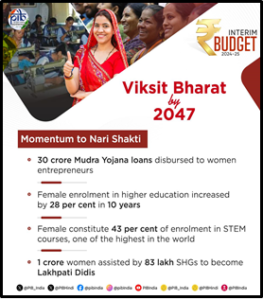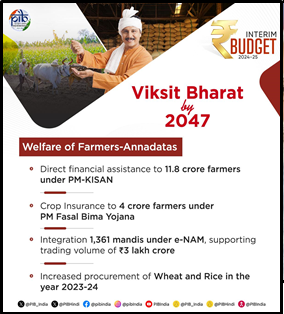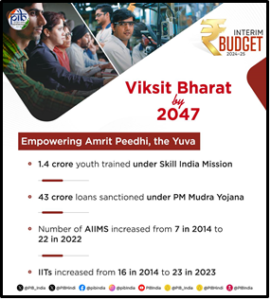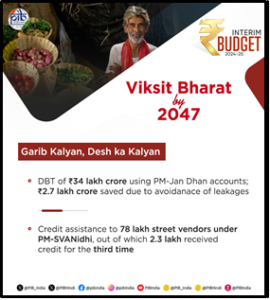Viksit Bharat
@newsonair - FILE PICS
News
In the Lok Sabha’s debate on the ‘Motion of Thanks’ to the President’s speech during the joint sitting of the two Houses, the Prime Minister emphasized that during the next term of the NDA government, India’s economy will rise to become the third largest in the world.
‘Viksit Bharat’ Remarks by PM
- According to the Prime Minister, Viksit Bharat’s objectives will be achieved through the empowerment of women, youth, farmers, and the impoverished;
- He stated that the development of the nation would be ensured by fortifying the four pillars that President Droupadi Murmu stressed in her speech;
- He stated that the world is now appreciating India’s rapid and large-scale economic growth and he outlined the government’s accomplishments, pointing out that several bold measures had been implemented to control inflation, spur economic expansion, break records for capital expenditure on infrastructure development, and create jobs.
- PM considered various points for Vikshit Bharat and they were:
- He praised ‘Nari Shakti’, emphasizing that women’s empowerment is visible everywhere today, from space to the Olympics, Sashastra Bal to Sansad;
- It was stated that India is now regarded as the global hub for the digital economy, highlighting the nation’s development and potential;
- The Made in India initiative is causing the nation to experience record manufacturing and exports and the tourism industry can generate millions of new job opportunities.
- Advocated for a strong opposition: The political party nepotism poses a threat to democracy and should be taken seriously by the entire nation and he restated the necessity of a robust opposition for the nation.
- Later, the Motion of Thanks to the President’s Address was approved by the House by voice vote, rejecting the amendments made by the opposition. The House adjourned for the day after adjourning business.
Vikshit Bharat
- About: An important milestone was reached with the official launch of Viksit Bharat last year. The prospect of elevating India to the status of a developed nation by 2047, its centennial year of independence.
- Features of the Viksit Bharat:
- Making businesses more innovative and efficient, raising the caliber and variety of goods and services, and growing both the domestic and global markets and it has the potential to boost exports, draw in investment, and promote economic dynamism;
- The transfer of resources from low-productivity industries (like agriculture) to high-productivity industries (like manufacturing and services).This can lessen poverty, increase economic growth, and generate jobs;
- Raising worker employability and skill levels, increasing the quantity and quality of labor supply, and making sure labor laws are just and effective and it has the potential to boost social protection, lower informality, and raise labor productivity;
- Making financial services and social welfare programs more accessible and affordable for the underprivileged and marginalized populations and along with improving their health, education, and sense of empowerment, this can also increase their income, savings, and consumption;
- Fortifying the institutions and procedures of governance, including accountability, transparency, participation, and the rule of law. This can decrease corruption, increase legitimacy and trust, and improve the provision of public goods and services.
- Embracing and advancing eco-friendly practices and technologies like energy efficiency, renewable energy, and climate resilience and it can lessen greenhouse gas emissions, slow down the deterioration of the environment, and open up new avenues for development and growth.
- Viksit Bharat by 2047: Present Situation
- India is currently classified as lower-middle income and by 2047, the Indian economy must surpass the $13,846 per capita GNI threshold in order to qualify as a high-income economy;
- The three main indicators of prosperity must be the focus and area of effort in order to meet the goal:
- incremental growth in per capita income and GDP over predetermined extended periods of time;
- shifts in the nation’s income inequality;
- changes in the currency exchange rate and the overall rate of inflation for that count.
- The World Bank’s Standards for National Economy:
- High Income Economies: These are countries with an annual per capita Gross National Income (GNI) of more than $13,846;
- Higher Middle-Class Economies: These fall between $4,466 and $13,845 in terms of GNI per person;
- Lower Middle-Income Economies: These have per capita GNIs ranging from $1,136 to $4,465.
- About ‘Gross National Income’ (GNI)
- The total income received by the citizens and enterprises of a nation, regardless of where it was earned, is known as the gross national income (GNI);
- As a measure of wealth, GNI is an alternative to GDP and in GNI the income is computed rather than output;
- The GNI of a nation can be computed by summing its foreign-source income;
- In numerous nations, the distinction between GNI and GDP is not very significant;
- GNI and GDP will differ significantly in countries with high levels of foreign corporate presence, foreign aid, or foreign direct investment.
NOTE: The above are a few facts in the form of infographics about ‘Vikshit Bharat.’
Credit: https://pib.gov.in/AllInfographics.aspx?MenuId=716
About ‘Motion of Thanks’
- About:
- Article 87 stipulates the President’s special address and according to the article, the President shall address both Houses of Parliament together at the opening of the first session following each general election to the House of the People and at the opening of the first session of each year, informing Parliament of the reasons for its summons;
- This type of address is known as a “special address” and is a yearly event;
- This Address must be given to the Joint Session of both Houses of Parliament;
- The President’s address, known as the ‘speech from the Throne in Britain’, is debated in both Houses of Parliament on a motion known as the ‘Motion of Thanks’.
- The President’s Address’s contents:
- As the government’s policy statement, the President’s Address is drafted by the government and it outlines the policies, projects, and programs that the current government intends to pursue with regard to the significant domestic and global issues, as well as a review of the government’s accomplishments and activities over the course of the previous year;
- Additionally, the Address lists, in general terms, the legislative matters that are planned to be discussed during that year’s sessions;
- The Motion of Thanks is adopted in its amended form if any of the proposed amendments are approved ( the amendments may address issues that the member believes the President’s address has neglected to address). The motion is put to a vote after the discussion.
- The significance of a motion of thanks: The House must approve the Motion of Thank or else it means the government has been defeated. It is also one method by which the Lok Sabha can convey its lack of faith in the administration.
Source: newsonair
ABOUT Universal Group Of Institutions
Universal Group Of Institutions is the first college of its kind in Karnataka that offers: PU – Commerce & Arts; BSc Environmental Science, B. COM & BA, BA.LLB (5 Years) with integrated coaching for IAS, IPS, KAS, UPSC, PSC, CSAT, CLAT as well as other competitive exams. Additional – 30+Certificate Courses, Test Series Available & answer writing.
Why PU & Degree with Integrated Coaching?
The IAS, IPS, KAS, UPSC, PSC, CSAT & CLAT exams are highly competitive, and many aspirants appear each year. Preparing for such tough exams is like running a marathon that needs proper direction, strategy, and constant motivation right from the 10+2 level.
Through our unique Integrated program, we “Nurture and Inspire” tomorrow’s thought leaders and nation builders to excel at such competitive exams.
Know more
🌐: https://bit.ly/Admission-Open-2024
📱: +91 9686664985 / 6366816611
Disclaimer: All efforts have been made to represent India accurately and as per India government. However, Universal School of Administration, Bengaluru and its associated people do not own any responsibility for the correctness or authenticity of the same.
Please notify on the email: [email protected] if any inconsistency is found for the factual correctness.

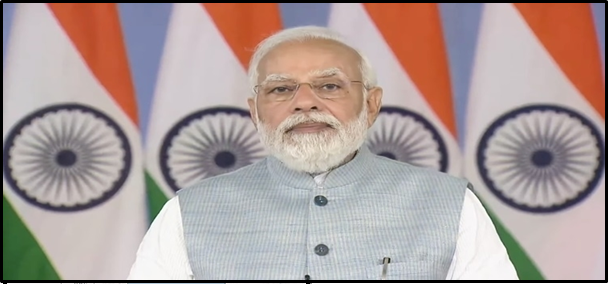 @newsonair - FILE PICS
@newsonair - FILE PICS